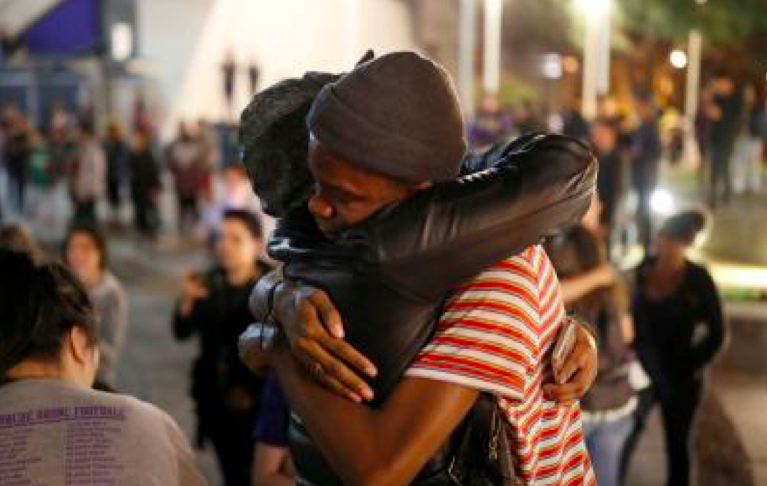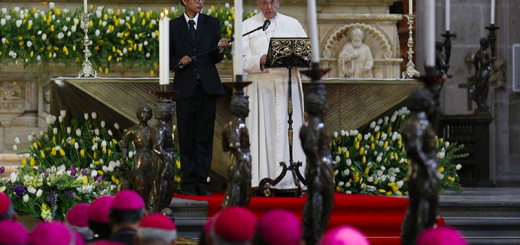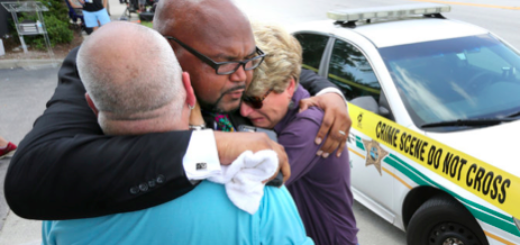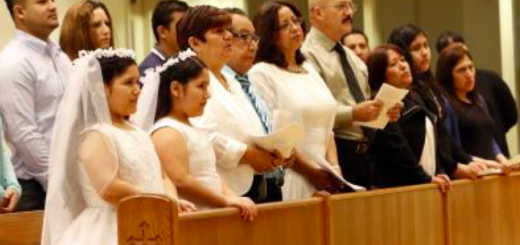Us Catholic Review – Solidarity Now

The Editors, in America, the National Catholic Review,9/11/16
Students embrace each other in the early morning hours of Nov. 9 during a demonstration at San Francisco State University in San Francisco following the election of Donald Trump as president of the United States. (CNS photo/Stephen Lam, Reuters)
(Editorial Note: Yes this was an election not about all-embracing Catholicity or unity but about division, narrow minded self-preservation (of protecting one’s Island of affluence) – against globalization, immigration, job loss, non-whites, gender equality (female president). Is solidarity possible now, when the mind-set of the majority is set diametrically against it? Both campaigned for extreme positions poles apart, one to the right and other to the left, leaving a wide chasm between, all for the sake of personal victory, party victory. Both must now find a middle path to tread, because virtue stands in the middle, in necessary compromise, in working together to reach achievable goals.
Trump had become a voice for angry, forgotten and desperate white Americans who stood centre stage once but pushed to margins now; for homeland security against invaders looting national wealth, job opportunities, time honoured respectable positions in society; for victims of wounded in home land by the influx of outside terrorists importing unacceptable religious and cultural values; for building walls of division to block Mexicans importing drugs and lose living; for massive deportation of Muslims, scapegoated illegal immigrants; for torture, death penalty; for patriarchy ill-treating and demeaning women as sex objects in word and deed; for withdrawing from NATO and environment protection; for friendship with Russia while fighting China; for total rubbishing of Obama policy at home and abroad.
Hillary instead stood for globalization, immigration and trade; for unity, collaboration and building bridges; for equality with those excluded because of their colour, culture or creed; for respecting moral outcasts like gays, lesbians, abortionists, marginalized due to inability to foot medical bills, decent housing; for victims of xenophobia, racism; for gun control to prevent callous murder of blacks in shootouts; for preferential educational opportunities for school dropouts; for religious liberty at home and abroad; for continuity of Obama Care and his foreign policies; for fighting all sorts of misogyny and prejudiced ideas about women until one triumphs as a woman president.
United States has thus become a divided house ready to explode. Happenigs in US have a lot of instructive applications also for India, now exploding under the heat of demonetizing to wipe out black money — an excellent idea very badly executed. Current protests across the US are warning signals to take immediate remedial steps to prevent the country from going to pieces. What is needed on both sides is more light than heat, more sense than sound, more reational persuation than emotional outbusts. President Trump’s body language and oral language have been a far cry for the better to those of Trump the trumpeting campaigner. He has set the tone in the right direction –  conciliatory, polite and respectful of the opposition. It is now for his critics to disagree in an agreeable way, to tread a middle path gainful for both. james kottoor, editor)
conciliatory, polite and respectful of the opposition. It is now for his critics to disagree in an agreeable way, to tread a middle path gainful for both. james kottoor, editor)
This was an election about class. This was an election about trade, globalization and fears about immigration. This was an election about upheaval and rejection of a distant elite. This was an election about race and gender. All of these statements are true.
Above all, however, this was an election about division. While president-elect Donald J. Trump won convincingly in the Electoral College, and thus requires both our support and our prayers, the harder task still lies ahead. No one should feel complacent about the divisions this election emphasized and exploited, which run far deeper than political allegiances. Mr. Trump said in his victory speech that now was the “time for America to bind the wounds of division,” and he is right. Yet no policy proposal, whether it promises to restore the lost jobs of American manufacturing or to ensure free college for all, will be enough to bridge those rifts. No political figure can now command enough allegiance or respect.
Nor are careful analysis and understanding of these issues sufficient to the task. There is no easy replacement for actual solidarity with others. The geographic, socioeconomic and communication bubbles that too often pass for civic life in modern America have not provided that solidarity and indeed have often worked against it.
As Pope Francis has consistently reminded the church and the world, it is the poor who disproportionately bear the costs of division and inequity. It is the poor, both on our doorstep and around the world, who are most invisible and easiest to ignore when concerns over economic stagnation tempt us to limit our compassion. And as those limits become walls that “close in some and exclude others,” as the pope said recently, we will discover that those who are excluded, whether because of race, nationality or class, are almost always far poorer than the ones raising the barriers.
The poor are on the other side when the barrier is a wall closing off the United States from Mexico. But poor people are also on the other side of the various barriers that divide the financial, governmental, educational and media elites from the rest of the country.
Neither economic stagnation nor the disconnect of the elites tells the whole story. This election was also starkly divided along racial and geographic lines, with suburban and rural areas and whites voting for Donald Trump while minorities and large urban centers voted for Hillary Clinton. Another way to read this election is to look at which constituencies the parties chose to write off. Mr. Trump ignored minority and urban voters and focused instead on Rust Belt states in the Midwest. Mrs. Clinton, following today’s conventional political wisdom, worked on increasing turnout among her base while ceding white, non-college-educated voters to Mr. Trump.
The fact that Mr. Trump’s strategy was successful while Mrs. Clinton’s failed does not give legitimacy to either. Neither strategy transcended a politics of division, while Mr. Trump’s added resentment to the mix as well. Both perpetuated the divisions from which the country suffers while doing nothing to reconcile them.
Recognizing these divisions should prompt a national examination of conscience. Republicans, while holding both houses of Congress and the presidency, must ask what they owe to the apparent slim plurality of the electorate that voted for Mrs. Clinton; they must also determine how to encourage Mr. Trump to ameliorate, rather than exploit those divisions. Democrats, recognizing that their party’s concentrated base has isolated them from the concerns of huge swaths of the country, must consider how to prioritize those voters’ concerns alongside other issues. Leaders across society must broaden the range of people to whom they listen and with whom they speak.
The church has an important role to play as the next four years of Mr. Trump’s presidency unfold. It must offer clear and vigorous moral guidance, not limiting itself to the anti-abortion promises to which Mr. Trump must be held but also speaking on issues of immigration, racial discrimination, international peace and social welfare. The church must stand firm in rejecting any return to the insults, misogyny and devaluation of human dignity that characterized much of Mr. Trump’s campaign rhetoric. The church must also offer the wisdom of Catholic social teaching to help shape proposals for addressing legitimate concerns about economic stagnation among those globalization has left behind without scapegoating the poor and retreating into isolationism and xenophobia.
Even more than its public moral witness, the church must encourage Catholics to find practical solidarity with their political opponents, sharing worship and conversation and the works of mercy. That is both more difficult and more costly than simply adopting better political positions, but it offers a hope of reconciliation, not merely the prospect of electoral victory.
In another article, John Carr, director of the Initiative on Catholic Social Thought and Public Life at Georgetown University in Washington, D.C. writes, as given below:
In the Time of Trump
WASHINGTON FRONT
Nov 14, 2016, John Carr
President-elect Donald Trump is seen with Senate Majority Leader Mitch McConnel, R-Ky,l in Washington, Nov. 10. Pope Francis said he would make no judgments about the United State's president-elect and was interested only in the impact his policies would have on poor people. (CNS photo/Shawn Thew, EPA)
The pundits and columnists, including this one, got it wrong. A nation deeply divided by race, class, ethnicity, education and sex gave Hillary Clinton a victory in the popular vote and Donald J. Trump the presidency in the electoral college.
Mr. Trump’s behavior and Mrs. Clinton’s campaign convinced most Americans that he lacked the temperament to be president. But they elected him because they did not trust her or believe she would bring change to Washington. Mr. Trump got fewer votes than Romney, but Mrs. Clinton got fewer votes among African-Americans, Latinos and young people than Obama. Donald Trump beat the Bushes, the Obamas and the Clintons and became a voice for angry and forgotten Americans. He is our president, needs our prayers and should not be underestimated.
This is the most improbable election since an elderly Jesuit from Argentina was elected pope. President Trump and Pope Francis are both improbable outsiders, but could not be more different. Francis began his papacy by calling himself a “sinner”; Trump campaigned as a “winner” who had never asked God for forgiveness. Francis brought humble ways to the papacy; Trump boasted about everything, including his predatory sexual behavior. Francis brought Syrian refugees to the Vatican; Trump promised to ban them from coming to America. Trump is a convert to Francis’ rejection of abortion but advocated the use of torture and expansion of the death penalty.
Francis came to Washington 14 months ago calling for the prioritizing of the poor and vulnerable, welcome for immigrants and care for creation. Mr. Trump will come to Washington in two months pledging to cut taxes mostly for the rich, deport immigrants and repeal environmental protections. When asked about Mr. Trump’s immigration wall, Pope Francis said Christians build bridges, not walls. After the election, Francis said, “I do not pass judgement on…politicians, I just want to understand what are the sufferings that their way of proceeding causes to the poor and the excluded.”
These different visions create divergent choices and challenges for American Catholics. How we deal with these contradictions will test our faith, identity and integrity. Some divisions are already clear. Sixty percent of white Catholics supported Mr. Trump, and 67 percent of Latino Catholics supported Mrs. Clinton.
These conflicts challenge Catholic leadership, whether Republicans or Democrats, in different ways. If Mr. Trump keeps his commitments, bishops will not need to defend the Hyde Amendment or federal conscience clauses. However, they must protect human life and dignity in other ways if the new administration and Congress try to undermine the safety net or access to health care, reinstate torture or abandon environmental protections. Mr. Trump has demonized immigrants and refugees and called for massive deportations and bans based on religion. Archbishop Gomez offers an example of how they need to defend the lives and dignity of immigrants, refugees and Muslims as clearly as they have defended the religious freedom of the Little Sisters of the Poor.
Catholic Republicans need to ensure that Mr. Trump honors his pledges on abortion and religious liberty at home and abroad. They should resist other policies that would hurt the poor or threaten global solidarity and peace. They especially need to address the anger and vulnerability generated by a Trump campaign that fanned racial fears, scapegoated immigrants, demeaned women and won with mostly white, mostly male voters. Can they persuade their party to act on poverty and criminal justice reform, voting rights and compassionate immigration policies?
Catholic Democrats need to take on the liberal identity politics that failed to respond to the pain of working class families and a Clinton campaign that called voters “irredeemable” and rarely even said the word poor. They should make clear that a party that makes “reproductive rights” a centerpiece and overcoming poverty an afterthought does not appeal to Catholic values and hopes. Can they help their party recover its voice and refocus its priorities on workers and poor families, on environmental and economic justice over culture war issues?
All Catholics, whatever our party or ideology, should remember that the moral test of our nation is how the weakest are faring. We should recall Pope Francis’ challenge in our Capitol “to defend and preserve the dignity of your fellow citizens in the tireless and demanding pursuit of the common good.”(John Carr is director of the Initiative on Catholic Social Thought and Public Life at Georgetown University in Washington, D.C.)

















